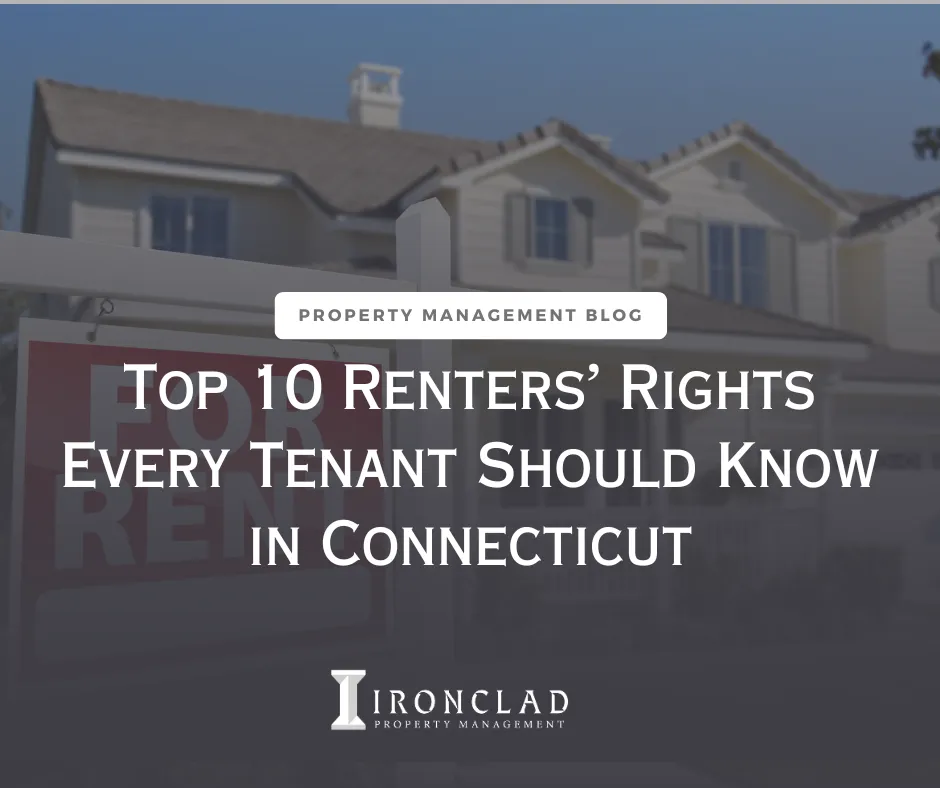
Top 10 Renters’ Rights Every Tenant Should Know in Connecticut
Renting in Connecticut comes with powerful protections. Whether you are a college student signing your first lease or a long-term tenant in a multi-family home, the law is on your side if you know where to look.
From security deposits to repairs and eviction timelines, Connecticut’s landlord and tenant statutes are detailed and well-enforced. Here is what every tenant should know before signing, renewing, or ending a lease agreement.
1. You Have a Right to a Safe, Habitable Home
Connecticut General Statutes Section 47a-7 requires landlords to comply with all building and housing codes that materially affect health and safety. This includes providing heat, running water, hot water, electricity, plumbing, and properly maintained structural elements.
As outlined by the CT Judicial Branch, tenants can report violations to local housing officials and may be entitled to remedies if landlords fail to act. 211CT notes that landlords must fix serious problems within a reasonable timeframe, usually 15 days after written notice.
2. You Must Receive Proper Notice for Entry
While landlords do have the right to enter your unit for maintenance or inspections, they must give reasonable notice, typically interpreted as at least 24 hours, and only enter at reasonable times unless there is an emergency, according to Connecticut General Statutes Section 47a-16.
Yale College´s off-campus housing guide reinforces this. Landlords cannot enter without prior notice or consent. Repeated unauthorized entry may violate your right to privacy.
3. Security Deposits Are Strictly Regulated
Connecticut law limits security deposits to no more than two months’ rent or one month if the tenant is 62 or older, under Section 47a-21(b)(1). Landlords must place deposits in an interest- bearing escrow account and return the deposit within 21 days of lease termination or 15 days after receiving a forwarding address, whichever comes later. Landlords who fail to comply may owe the tenant up to twice the amount wrongfully withheld.
4. Evictions Must Go Through the Court
Evictions in Connecticut follow a strict legal process called summary process. A landlord must serve a Notice to Quit and file for eviction through housing court, according to Sections 47a-23 through 47a-26. Only after a court judgment can a marshal remove a tenant.
The 211CT tenant guide explains that it is illegal for a landlord to lock you out, remove belongings, or shut off utilities as a way to force you to leave. Doing so could expose them to legal action and financial penalties.
5. You Have the Right to Privacy
Tenants are entitled to quiet enjoyment of their rental property. Under Section 47a-16, landlords must provide prior notice before entering your unit. Unauthorized or repeated intrusion can be considered harassment.
The Yale College guide emphasizes that even with the landlord’s ownership of the building, tenant privacy must be respected under state law.
6. Tenants Can Withhold Rent for Serious Repairs
Tenants may legally withhold rent or use the repair and deduct method if the landlord fails to make timely repairs that impact health and safety. This is allowed only when the problem was reported in writing, the landlord had a reasonable opportunity to correct it, and the repair is necessary and not cosmetic.
As detailed by 211CT, tenants must document everything and may want to speak to a housing mediator before withholding rent to avoid legal complications. For minor maintenance issues, many local property managers like Ironclad PM recommend tenants submit photos and repair requests early to prevent escalation.
7. You Cannot Be Discriminated Against
Connecticut law aligns with the federal Fair Housing Act and extends protections further under Section 46a-64c. It is illegal for landlords to discriminate based on race, national origin, religion, age, sex or gender identity, disability, sexual orientation, marital status, or family status.
The CT Judicial Branch summary notes that discrimination can include refusing to rent, changing terms, or harassment. Tenants can file a complaint with the Commission on Human Rights and Opportunities.
8. You Must Receive Notice of Rent Increases
If you are renting on a month-to-month basis, your landlord must provide written notice at least 30 days before raising your rent, according to Section 47a-23(d). If you are under a fixed-term lease, rent cannot be increased until that lease expires unless stated otherwise in the contract.
Tenants are under no obligation to accept mid-lease changes unless they agree to them in writing.
9. Lease Terms Must Be Fair and Legal
Even if you sign it, a lease cannot waive your basic legal rights. Under Section 47a-4, lease terms that contradict landlord obligations, such as making tenants responsible for major repairs, are void.
If requested, landlords must provide a written lease. Tenants should review all clauses carefully. Unfair terms like waiving your right to notice or allowing eviction without process are unenforceable. For more information on lease clauses, Ironclad PM’s blog offers examples of common legal and illegal terms.
10. You Have a Right to Move-Out Transparency
At the end of your tenancy, your landlord must provide an itemized list of any deductions from your security deposit, as required by Section 47a-21(d)(2). Deductions can only cover actual damage beyond normal wear and tear.
To protect yourself, document the property’s condition with photos at move-in and move-out. Rental mistakes and small oversights like skipping a final walkthrough can lead to unfair deductions or deposit loss.
Final Thought: The Law Is on Your Side If You Know It
Being a tenant in Connecticut comes with real power. From repair timelines to privacy and fair treatment, your rights are backed by state law, but none of that helps if you do not know what to ask for or when to push back.
If you run into issues, keep everything in writing. Document your communications, save receipts, and reach out for support early. With a little knowledge and the right support, you can rent with confidence and protect your space.